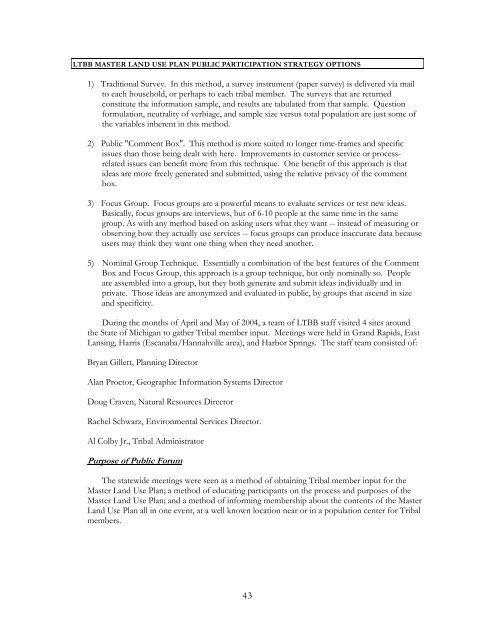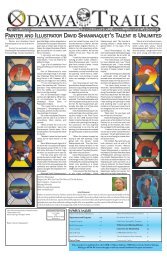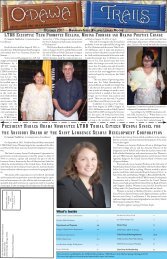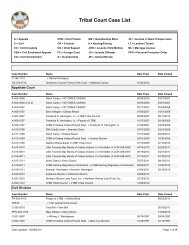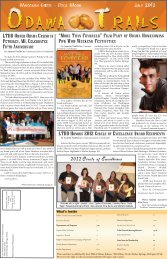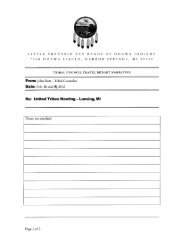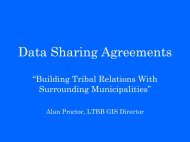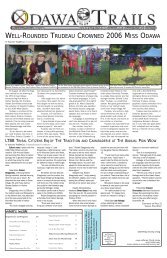LTBB Master Land Use Plan - Little Traverse Bay Bands of Odawa ...
LTBB Master Land Use Plan - Little Traverse Bay Bands of Odawa ...
LTBB Master Land Use Plan - Little Traverse Bay Bands of Odawa ...
You also want an ePaper? Increase the reach of your titles
YUMPU automatically turns print PDFs into web optimized ePapers that Google loves.
<strong>LTBB</strong> MASTER LAND USE PLAN PUBLIC PARTICIPATION STRATEGY OPTIONS<br />
1) Traditional Survey. In this method, a survey instrument (paper survey) is delivered via mail<br />
to each household, or perhaps to each tribal member. The surveys that are returned<br />
constitute the information sample, and results are tabulated from that sample. Question<br />
formulation, neutrality <strong>of</strong> verbiage, and sample size versus total population are just some <strong>of</strong><br />
the variables inherent in this method.<br />
2) Public "Comment Box". This method is more suited to longer time-frames and specific<br />
issues than those being dealt with here. Improvements in customer service or processrelated<br />
issues can benefit more from this technique. One benefit <strong>of</strong> this approach is that<br />
ideas are more freely generated and submitted, using the relative privacy <strong>of</strong> the comment<br />
box.<br />
3) Focus Group. Focus groups are a powerful means to evaluate services or test new ideas.<br />
Basically, focus groups are interviews, but <strong>of</strong> 6-10 people at the same time in the same<br />
group. As with any method based on asking users what they want -- instead <strong>of</strong> measuring or<br />
observing how they actually use services -- focus groups can produce inaccurate data because<br />
users may think they want one thing when they need another.<br />
5) Nominal Group Technique. Essentially a combination <strong>of</strong> the best features <strong>of</strong> the Comment<br />
Box and Focus Group, this approach is a group technique, but only nominally so. People<br />
are assembled into a group, but they both generate and submit ideas individually and in<br />
private. Those ideas are anonymzed and evaluated in public, by groups that ascend in size<br />
and specificity.<br />
During the months <strong>of</strong> April and May <strong>of</strong> 2004, a team <strong>of</strong> <strong>LTBB</strong> staff visited 4 sites around<br />
the State <strong>of</strong> Michigan to gather Tribal member input. Meetings were held in Grand Rapids, East<br />
Lansing, Harris (Escanaba/Hannahville area), and Harbor Springs. The staff team consisted <strong>of</strong>:<br />
Bryan Gillett, <strong>Plan</strong>ning Director<br />
Alan Proctor, Geographic Information Systems Director<br />
Doug Craven, Natural Resources Director<br />
Rachel Schwarz, Environmental Services Director.<br />
Al Colby Jr., Tribal Administrator<br />
Purpose <strong>of</strong> Public Forum<br />
The statewide meetings were seen as a method <strong>of</strong> obtaining Tribal member input for the<br />
<strong>Master</strong> <strong>Land</strong> <strong>Use</strong> <strong>Plan</strong>; a method <strong>of</strong> educating participants on the process and purposes <strong>of</strong> the<br />
<strong>Master</strong> <strong>Land</strong> <strong>Use</strong> <strong>Plan</strong>; and a method <strong>of</strong> informing membership about the contents <strong>of</strong> the <strong>Master</strong><br />
<strong>Land</strong> <strong>Use</strong> <strong>Plan</strong> all in one event, at a well known location near or in a population center for Tribal<br />
members.<br />
43


